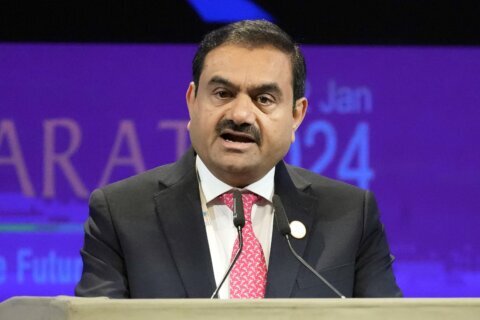Tashna Nair from Mumbai knew she wanted to study in the U.S. but wasn’t sure how to go about it. She began searching online for organizations that support prospective international students and came across EducationUSA, a Department of State-supported network of advising centers that helps students seeking to study in the U.S.
Nair says she wanted guidance on how to successfully submit applications to U.S. universities and help with decision-making for other education-related aspects, so she connected with her local India-based EducationUSA center.
EducationUSA has about 430 advising centers in more than 175 countries and territories. The centers are located at U.S. embassies and consulates, Fulbright Commissions, binational cultural centers, nongovernmental organizations, and foreign universities and libraries, per a U.S. State Department spokesperson.
“I used EducationUSA for all aspects related to applying for my master’s degree in the U.S.A., from making a list of colleges to talking to my adviser about college essays before I could submit them in my application,” Nair says.
[Read: What Graduate School Is and Who Should Consider Attending.]
For prospective international students interested in pursuing an undergraduate or graduate degree at a U.S. college, EducationUSA can be a good starting point and can offer support and counseling along the way. Here are a few ways these centers can help.
Finding the Right School Fit
Deciding on which schools to apply to can be a difficult task. Advisers at EducationUSA centers can help students narrow their list or add schools students hadn’t considered.
“Learning about the options is important considering the obsession of ranking in Taiwan or Asia in general,” Tracie Chen, EducationUSA adviser at Fulbright Taiwan, wrote via email. “We hope to help students and parents to learn about options outside of Ivy League, including community colleges, liberal art schools and other four-year colleges/universities that are less-known.”
Chen says she invites school representatives in to share and connect directly with students through various events.
Kathy Aziz, director of EducationUSA advising based at the United States Educational Foundation in Pakistan, says her center, like others, offers free advising services to students, including one-on-ones and a variety of in-person and virtual sessions.
“The first step is guiding students on how to research the right fit college or university based on the student’s field of study, budget and preferences on university size, location, diversity, etc.,” Aziz wrote in an email.
Indian national Nia Sequeira says she was interested in universities with a strong research background, faculty and courses in the sciences but had no idea which university was the right fit. She says her adviser was a big help.
“Part of my assignment each week was weighing the pros and cons of each university I shortlisted. This was an exhausting process, but with the help of my adviser, we identified a university that met all my requirements,” says Sequeira, who is pursuing a bachelor’s degree in biology a Creighton University in Nebraska.
Nair knew she was interested in the entertainment industry and liked television and film. She wanted to pursue a degree that balanced the creative and business aspects and is studying television, radio and film at S.I. Newhouse School of Public Communications at Syracuse University in New York.
“EducationUSA helped me tailor my university list according to those requirements and vision after I researched the universities I was interested in,” Nair says.
Helping With the Admission Process
The admission process at U.S. universities can be confusing for prospective international students, but EducationUSA advisers can help.
“We guide students through the application process and timeline,” says Aziz.
[Read: A Complete Guide to the College Application Process.]
Aziz says the centers have workshops on writing statements of purpose or essays, test preparation and more.
EducationUSA helped Nair follow specific steps throughout the application process, and explained how GRE and TOEFL scores and academics are reflected in her applications. The center also gave her essay advice and offered “guidance through mini decisions that needed to be made to have clarity with selecting a university after receiving decisions,” Nair adds.
Students and parents can have direct access to U.S. university admission representatives at EducationUSA fairs abroad, too, Aziz says, which can be helpful to discuss programs and admission requirements.
Ruth Williams Moore, director of the International English Center at the University of Colorado Boulder, says the school attends the fairs to meet and connect with high school counselors and prospective students.
“The fairs not only help us showcase what a top R-1 (i.e. research) university in the West has to offer but also provide an opportunity for students to have meaningful conversations with our admissions team,” Williams Moore says.
Preparing Students for Study in the U.S.
EducationUSA advisers are knowledgeable about U.S. schools and can help prepare students for their studies.
“Many EdUSA advisers are U.S.-educated, and those who aren’t are thoroughly familiar with U.S. higher education and American culture,” says Mark Ashwill, managing director of Capstone Education, an educational consulting company based in Vietnam.
For students who are accepted and enrolled at a U.S. university, Aziz says, the centers hold pre-departure orientations each summer “to help students know what to expect when they arrive on campus.”
[Read: 3 Steps International College Students Should Take Before Coming to Campus]
During any step, students can use resources or turn to EducationUSA advisers for help, says Deborah Rosario, senior EducationUSA adviser based at the United States-India Educational Foundation in Mumbai. This includes international students who want to transfer from one U.S. university to another.
Indian national Atharv Agasti says he heard about EducationUSA from a cousin. When he was looking to transfer colleges after a year at Boston University in Massachusetts, he spoke with an adviser “who understood what kind of experience I was looking for and helped me refine the list of colleges I was applying to.”
Agasti ended up transferring to Michigan State University, a recommendation he received from his EducationUSA adviser. He’s on track to graduate with a degree in supply chain management in December.
For Nair, who also plans to graduate in December, EducationUSA’s guidance and advice have been invaluable.
“Just asking them about things that are confusing and you want to double-check about or them guiding you through the steps lifts a big weight of, ‘Am I doing things the right way?'” Nair says.
More from U.S. News
A Guide to Scholarships for International Students
U.S. Education System: What International College Students Should Know
3 Biggest Reasons to Choose to Study in the U.S.
What International Students Should Know About EducationUSA originally appeared on usnews.com







